- Home
- Bertolt Brecht
Bertolt Brecht
Bertolt Brecht Read online
The Collected Short Stories of Bertolt Brecht
RELATED BERTOLT BRECHT PUBLICATIONS FROM BLOOMSBURY METHUEN DRAMA:
Prose
Brecht on Art and Politics, edited by Tom Kuhn and Steve Giles
ISBN 978-0-4137-7353-1
Brecht on Film and Radio, edited by Marc Silberman
ISBN 978-0413-72760-2
Brecht on Performance: Messingkauf and Modelbooks, edited by Tom Kuhn, Steve Giles and Marc Silberman
ISBN 978-1408-15455-7
Brecht on Theatre, edited by Marc Silberman, Steve Giles and Tom Kuhn
ISBN 978-1408-14545-6
Bertolt Brecht’s The Business Deals of Mr Julius Caesar
ISBN 978-1472-58272-0
Plays
Brecht Collected Plays: 1
ISBN 978-0413-68570-4
Brecht Collected Plays: 2
ISBN 978-0413-68560-5
Brecht Collected Plays: 3
ISBN 978-0413-70460-3
Brecht Collected Plays: 4
ISBN 978-0413-70470-2
Brecht Collected Plays: 5
ISBN 978-0413-69970-1
Brecht Collected Plays: 5
ISBN 978-0413-69970-1
Brecht Collected Plays: 6
ISBN 978-0413-68580-3
Brecht Collected Plays: 7
ISBN 978-0413-68590-2
Brecht Collected Plays: 8
ISBN 978-0413-77352-4
Berliner Ensemble Adaptations
ISBN 978-1472-51438-7
The Caucasian Chalk Circle
ISBN 978-0413-30850-4
The Good Person of Szechwan
ISBN 978-0413-58240-9
Life of Galileo
ISBN 978-0413-76380-8
Mother Courage and Her Children
ISBN 978-0413-41290-4
The Resistible Rise of Arturo Ui
ISBN 978-0413-47810-8
The Threepenny Opera
ISBN 978-0413-39030-1
For a complete listing of titles: www.bloomsbury.com/drama
The Collected Short Stories of Bertolt Brecht
Edited by
John Willett and Ralph Manheim
Translated by
Yvonne Kapp, Hugh Rorrison and Antony Tatlow
With a New Introduction by
Marc Silberman
Brecht General Editor
Tom Kuhn
Contents
Introduction
The Bavarian Stories (1920–1924)
Bargan Gives Up
Story on a Ship
The Revelation
The Foolish Wife
The Blind Man
A Helping Hand
Java Meier
The Lance-Sergeant
Message in a Bottle
A Mean Bastard
The Death of Cesare Malatesta
The Berlin Stories (1924–1933)
The Answer
Before the Flood
Conversation about the South Seas
Letter about a Mastiff
Hook to the Chin
Müller’s Natural Attitude
North Sea Shrimps
Bad Water
A Little Tale of Insurance
Four Men and a Poker Game
Barbara
The Good Lord’s Package
The Monster
The Job
Stories Written in Exile (1933–1948)
Safety First
The Soldier of La Ciotat
A Mistake
Gaumer and Irk
Socrates Wounded
The Experiment
The Heretic’s Coat
Lucullus’s Trophies
The Unseemly Old Lady
A Question of Taste
The Augsburg Chalk Circle
Two Sons
Appendix
Life Story of the Boxer Samson-Körner
Editorial Notes
The Principal Collections of Brecht’s Short Stories
Notes on Individual Stories
Index
Index of Titles in German
The Translators
Yvonne Kapp, pages 178–180, 191–235, 247–254, 261–282
Hugh Rorrison, pages 79–178, 180–191
Antony Tatlow, pages 7–77, 254–261
John Willett, pages 236–247, 283–308.
Introduction
While best known as a dramatist and poet, Bertolt Brecht was first and foremost a prose writer, more specifically a storyteller. Indeed, the first volume he published on his return to Germany in 1949 was an anthology of short stories, prose anecdotes and narrative poems, Tales from the Calendar, as he called them. After a bitter exile of sixteen years, Brecht chose, in other words, to reintroduce himself to the German audience with these realistic stories fashioned in the tradition of popular narratives that aim to instruct and entertain. Their unpretentious tone and reporting style are typical of Brecht’s art of storytelling. Although his reputation in the English-speaking world is that of a dramatist and theatre innovator, it would be a mistake to underestimate the importance of his narrative prose writings. This republication of the anthology of short stories in translation offers an opportunity to reconsider from a different perspective this internationally regarded writer. Those who already know Brecht’s plays and/or poetry will perceive the echoes and resonances; those who do not will discover a master storyteller concerned with the way the process of history manifests itself in everyday events. At the same time, this is part of a major series of Brechtian volumes that includes Brecht on Film and Radio (2000), Brecht on Art and Politics (2004), Brecht on Theatre (2014), Brecht on Performance (2014), and his novel The Business Deals of Mr Julius Caesar (forthcoming in 2016).
Brecht was a writer who always sought to structure events in a clear, linear direction with a beginning and an end. His theatre works as well as his poetry bear witness to this constant in his writing style. The best-known plays draw their strength from the centrality of a tale or report, from Baal’s ballads, to the commentator in The Threepenny Opera who sings of Mac the Knife’s crimes, to the theatrical conceit of The Caucasian Chalk Circle’s framing device for the central parable. The notes to many of the plays include the dramatist’s attempts to summarize the narration – in the form of a newspaper article, a schematic listing of events or a series of headings for the scenes. Even Brecht’s abundant poetry, echoing in the famous songs and lyrical passages of the plays, is less striking for strong images than for the clarity of language and narrative coherence. First came the story, then came the rest.
Unlike in Germany, where his stories and parables are anthologized in school readers and an acknowledged part of the canon, Brecht’s prose is not well known to Anglophone readers. The short stories assembled, translated and republished in this volume are only a small selection of his prose writing, which encompasses anecdotes, aphorisms, dialogues, novels, screenplays, journals and diaries, prose poems, essays and theoretical treatises. In fact, the number of genuine short stories Brecht wrote is quite limited when compared to the plays and poetry (the many film scripts and ideas he sketched out as stories are excluded here; see Brecht on Film and Radio), and unlike his work on the plays and the poetry, which was continual and developed over his entire lifetime, the composition of the stories falls into three distinct periods.
The Bavarian stories are among the first texts Brecht wrote in his hometown of Augsburg and during his student and bohemian years in Munich. As early as 1913 he was contributing anecdotes to his school newspaper, and between 1914 and 1918 he penned three stories about the war. Those collected here – written between 1920 and 1924 – treat mainly autobiographical problems such as existential helplessness and isolation, male comradeship and marriage, and
the yearning for a better world, even where they are dressed up as adventuresome or exotic parables. In this respect they correspond to the screenplays Brecht was turning out at this time too, genre pieces that – like the prose stories – provided a strong form to guide his lively imagination. The first story in this section, ‘Bargan Gives Up’, was also the first of Brecht’s published texts (1921) that brought him recognition beyond Bavaria, and book publishers as well as newspapers and journals were initially more interested in these early stories and his poems than in the plays.
The Berlin stories, written after Brecht moved to the city permanently in 1924 and before he fled Germany in 1933, mark the most intense period of his short-story writing, possibly motivated more by financial considerations than a commitment to the prose form as such. Their sober style and documentary realism reflect the influence of Weimar Germany’s ‘new objectivity’ (Neue Sachlichkeit) on Brecht. The emphasis on authenticity, the explicit naming of places and dates, and the almost naturalistic interest in details balance the stories’ more complex formal structures and layered narrative perspectives. Thematically the stories from this middle period are dominated as well by topical issues of the 1920s: Americanism as an alternative to German philistinism (although not necessarily portrayed as a positive one), sports, business and engineering technology. Boxing in particular fascinated Brecht at this time because it allowed him to articulate in a popular domain the issues of fame and the problems of maintaining it that also concerned him as an artist. For example, the fragmentary ‘Life Story of the Boxer Samson-Körner’ (see the appendix) focuses on the way a reputation is gained through economic and social factors, not necessarily through talent. Like the plays of the Berlin period, Brecht’s short stories aim to reveal the social behaviour of individuals – either right or wrong – through their actions, which are made visible for the reader’s examination.
The majority of the stories in the final group were written during the years in Scandinavian exile, mostly between 1937 and 1940, while Brecht was living in Denmark and Sweden. Seven of them were later included in the post-war collection Tales from the Calendar. His first prose pieces from the exile period used operative forms, satires and pamphlets meant as ammunition in the struggle against fascism. As the prospects for a speedy defeat of National Socialism diminished, so too did his short prose change in function and style. The material and the main characters became historical and generalizable, with a strong socially critical orientation (e.g. Socrates, Francis Bacon in ‘The Experiment’, Giordano Bruno in ‘The Heretic’s Coat’, Lucullus). In contrast to the stories of the 1920s, those of the final period are more accessible, but also more didactic. The protagonists tend to be simple, sometimes even naive people misused or misled by those in power (e.g. a soldier from the First World War, a servant girl in ‘The Augsburg Chalk Circle’, an ‘unseemly’ grandmother or a rural mother in ‘Two Sons’) instead of flamboyant or clever outsiders as in the earlier stories. All of the stories rely on a precise, lean narrative logic and economical use of language that strive to inform the reader quickly but dependably.
The dominant tradition of psychological interiority in German literature offered Brecht few models for his kind of prose writing. The first, unrealized plan in 1920 for a collection of short prose works based on biblical motifs (to be called Gesichte or visions) was inspired formally by the French poet Rimbaud’s prose poems. Traces can still be recognized in the ‘Rimbaudesque’ story ‘The Revelation’. After the war, the boom in newspaper and magazine publication opened up new publication opportunities, and Brecht welcomed the challenge from the popular media to produce short prose pieces with strong plots and external conflicts. Among English-language writers (e.g. Jack London, G. K. Chesterton, Upton Sinclair, Rudyard Kipling, Sherwood Anderson, Sinclair Lewis) he found more congenial models that corresponded to his own objectifying, distanced manner of formulating prosaic events, actions and behaviour. Later, in exile, when he did turn to the German tradition of pious calendar tales, he cunningly revised it by converting the didacticism to his own ends of interventionist thinking (‘eingreifendes Denken’). In this respect, it is remarkable that Brecht’s short stories are consistently the least explicitly political part of his writing, although this should not suggest that they are secondary products of his poetic imagination. The stories written after 1927, for instance, when he was moving closer and closer to Marxism, do not directly document the transition to more ideologically marked forms and themes that characterize the plays, poems and essays of the period. The prize-winning story ‘The Monster’ (1928) or ‘The Job’ and ‘Safety First’ (both 1933) do reflect, however, his growing insight into relationships of power and class domination.
The thirty-seven selections gathered here are divided into three groups corresponding to the major divisions in Brecht’s life, presented as far as can be determined in chronological order according to the time of writing. In addition, one unique and unfinished story about the boxer Paul Samson-Körner (mentioned above) is included in the appendix. The translations in this form were first published in 1983 and appear here unchanged. The editorial notes at the back, written by John Willett and Ralph Manheim for that earlier edition, have been updated, based on the new German edition of Brecht’s complete works (Werke), the ‘Grosse kommentierte Berliner und Frankfurter Ausgabe’ in thirty volumes (1988–2000), published by Aufbau Verlag (Berlin and Weimar) and Suhrkamp Verlag (Frankfurt am Main). These notes include a brief overview of the prose collections planned and completed by Brecht, as well as those that appeared after his death, followed by comments on the individual stories.
Marc Silberman
Madison, Wisconsin (2014)
The Bavarian Stories (1920–1924)
Bargan Gives Up
At midnight we made the ship fast in a bay which was sleeping under thick, fat-leaved trees, put biscuits and dried dates in our pockets and, treading carefully as if on eggs, pushed on westwards through the bush. Bargan who led us like a swarm of kids – not that we buccaneers were exactly babes-in-arms – Bargan had a flair for the stars and when it came to getting his bearings he was as good as God Almighty. We found our way through the monstrous forest, which was more tangled than a ball of twine, to the clearing, and ahead of us in the mild light lay the town, which we had been looking for like our own home before daybreak. Silently we began our terrible business; at first none of them bothered us but then, awakened from their sleep by destroying angels, they turned nasty and a dirty battle was fought in the houses. All of us together would run into a house, scuffle with men in shirtsleeves who struck at us with tables and doors, and defend ourselves against the women who behaved like hyenas. Their screaming filled the air like an icy mist as step by step we pressed towards the citadel, which consisted of wooden buildings leaning against a bare mountain. A group of us, myself among them, pressed on through an open gate, on the heels of people fleeing; the gate closed and the women standing in their shifts on the walls and scaffolding threw stones and wooden objects at our heads, so we didn’t feel too comfortable. Our heads were already bleeding and we were whistling like mad to make Bargan hear us when he came up from the rear with some men. Ahead of all the rest, he had swum down the small swift river under the trussing into the citadel, where a fish would have slit its stomach on the jagged stones, but Bargan couldn’t stand even one of us dying. From then on things went faster, and all the more so since Bargan had one of his incredible ideas. The most tenacious of the enemy had barricaded themselves in the topmost wooden house which couldn’t be reached except with wings. Those who hadn’t yet been killed ran towards it from all sides. This soon made the house very strong and if it swallowed any more of the enemy that way (and they were able to arm themselves inside) this could easily turn it into a damn rat-trap, because we buccaneers were scattered all over the settlement and many of us had already started satisfying the women; you can leave children to slaughter turtles. That’s why Bargan had a number of women strung together
, and some of us, in full view of the blockhouse, began to rape them, which looked terrific and made such an impression on the woodworms that, against all the rules of cut and thrust, they broke like young bulls out of their wooden security and were slaughtered like young lambs, trembling and helpless, one after the other or in groups of ten. And so the town was taken thanks to Bargan’s wisdom and knowledge of human nature, and when the fine houses woke up we were stomping around inside them admiring our new possessions. It was a good caper but if we had seen the snag – sharp, crooked and murderous – as we do today five weeks later, we would all rather have conquered flaming hell than that beautiful town filled to bursting with useful things. The prisoners – there were around seventy, the others slept on in their houses till the day of judgment, it won’t rain on them – we herded together into a courtyard of the town hall, where they could sit on the stones and rest. For a few hours we were drunk with victory and nobody had time to bother about them, it wasn’t until midday that Bargan arrived to call the roll and then he too went in to have a look at the women. They got up and stood around in the yard, trembling with the cold for they were mostly wearing only their shifts, it all happened so damned quickly, with God turning his face away from them to have a look at the harvest in Brazil instead. By the way there were a few pretty women among them, that is to say they were in their shifts and shivering and we hadn’t seen any young flesh for seven weeks. A shark would have thought we were dying for it like God for a repentant sinner and Bargan made a start straightaway by picking a young woman to come to his tent. We didn’t look at them carefully at first, Bargan hadn’t much taste, he slept with all kinds of scum, and it wasn’t for nothing people said he had the American sickness that rots a good Christian bit by bit. But then a quarrel arose between Bargan and his friend Croze, the ‘Clubfoot of St. Marie’, and it was about this young woman both of them wanted. Bargan would have knocked down anybody else immediately – for we friends never fought among ourselves over brandy or money, nor over honour either, only over women – but for some ungodly reason Bargan had taken a fancy to the fat fellow who had lain on the road like an unwanted dog till Bargan drew him to his bosom. Now he was swollen like a poisoned dog, drank all over the place, played with Bargan’s gold pieces to which everybody’s good sweat stuck except his own, and now before our very eyes he was arguing with Bargan himself over a woman who belonged to Bargan just as surely as did his own foot. Soon we all began to shout, so Bargan, being by no means certain if his own foot belonged to him or not, finally had to take the woman, whereupon he held roll-call as usual while the Clubfoot of St. Marie stumped along the line behind him. All the time we looked into his eyes and I can tell you and could have done so then, treachery lay in their depths – slime and rotten fishes.

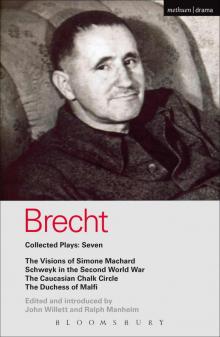 Bertolt Brecht: Mutter Courage und ihre Kinder 7
Bertolt Brecht: Mutter Courage und ihre Kinder 7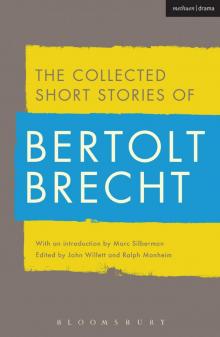 Bertolt Brecht
Bertolt Brecht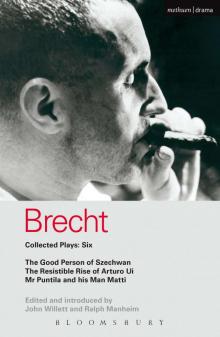 Bertolt Brecht: Mutter Courage und ihre Kinder 6
Bertolt Brecht: Mutter Courage und ihre Kinder 6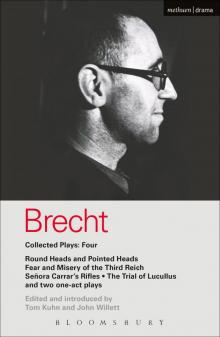 Bertolt Brecht: Mutter Courage und ihre Kinder 4
Bertolt Brecht: Mutter Courage und ihre Kinder 4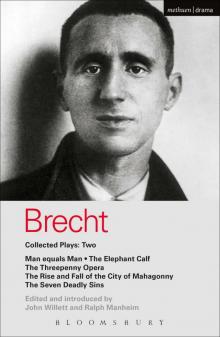 Bertolt Brecht: Mutter Courage und ihre Kinder 2
Bertolt Brecht: Mutter Courage und ihre Kinder 2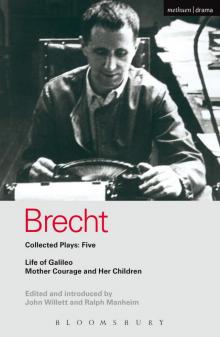 Bertolt Brecht: Mutter Courage und ihre Kinder 5
Bertolt Brecht: Mutter Courage und ihre Kinder 5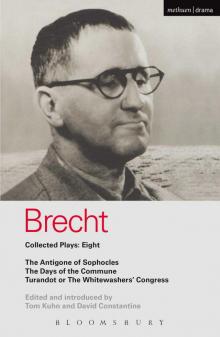 Collected Plays, Volume 4 (Bertolt Brecht: Plays, Poetry & Prose) 8
Collected Plays, Volume 4 (Bertolt Brecht: Plays, Poetry & Prose) 8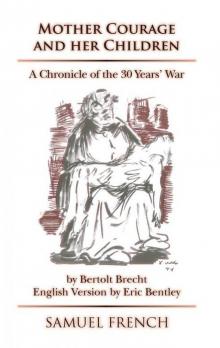 Mother Courage and Her Children
Mother Courage and Her Children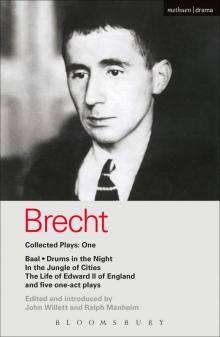 Bertolt Brecht: Mutter Courage und ihre Kinder 1
Bertolt Brecht: Mutter Courage und ihre Kinder 1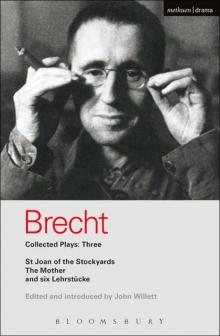 Brecht Collected Plays: 3: Lindbergh's Flight; The Baden-Baden Lesson on Consent; He Said Yes/He Said No; The Decision; The Mother; The Exception & the ... St Joan of the Stockyards (World Classics)
Brecht Collected Plays: 3: Lindbergh's Flight; The Baden-Baden Lesson on Consent; He Said Yes/He Said No; The Decision; The Mother; The Exception & the ... St Joan of the Stockyards (World Classics)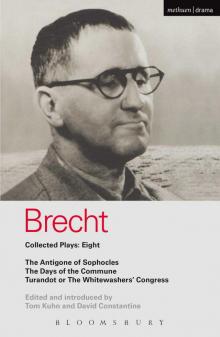 Brecht Plays 8: The Antigone of Sophocles; The Days of the Commune; Turandot or the Whitewasher's Congress: The Antigone of Sophocles , The Days of the Comm (World Classics)
Brecht Plays 8: The Antigone of Sophocles; The Days of the Commune; Turandot or the Whitewasher's Congress: The Antigone of Sophocles , The Days of the Comm (World Classics)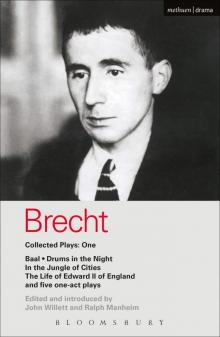 Brecht Collected Plays: 1: Baal; Drums in the Night; In the Jungle of Cities; Life of Edward II of England; & 5 One Act Plays: Baal , Drums in the Night , In the Jungle of Ci (World Classics)
Brecht Collected Plays: 1: Baal; Drums in the Night; In the Jungle of Cities; Life of Edward II of England; & 5 One Act Plays: Baal , Drums in the Night , In the Jungle of Ci (World Classics)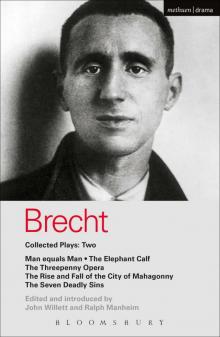 Brecht Collected Plays: 2: Man Equals Man; Elephant Calf; Threepenny Opera; Mahagonny; Seven Deadly Sins: Man Equals Man , Elephant Calf , Threepenny Ope (World Classics)
Brecht Collected Plays: 2: Man Equals Man; Elephant Calf; Threepenny Opera; Mahagonny; Seven Deadly Sins: Man Equals Man , Elephant Calf , Threepenny Ope (World Classics)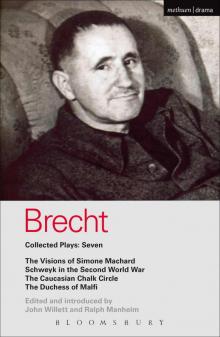 Brecht Collected Plays: 7: Visions of Simone Machard; Schweyk in the Second World War; Caucasian Chalk Circle; Duchess of Malfi (World Classics)
Brecht Collected Plays: 7: Visions of Simone Machard; Schweyk in the Second World War; Caucasian Chalk Circle; Duchess of Malfi (World Classics)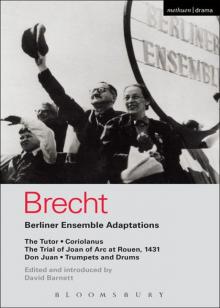 Berliner Ensemble Adaptations
Berliner Ensemble Adaptations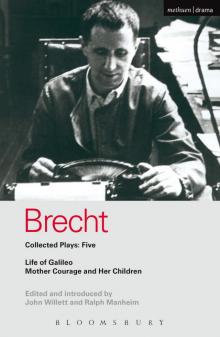 Brecht Collected Plays: 5: Life of Galileo; Mother Courage and Her Children (World Classics)
Brecht Collected Plays: 5: Life of Galileo; Mother Courage and Her Children (World Classics)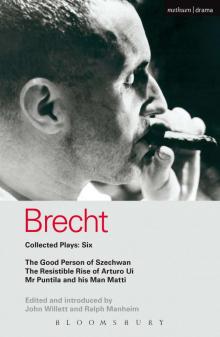 Brecht Collected Plays: 6: Good Person of Szechwan; The Resistible Rise of Arturo Ui; Mr Puntila and his Man Matti (World Classics)
Brecht Collected Plays: 6: Good Person of Szechwan; The Resistible Rise of Arturo Ui; Mr Puntila and his Man Matti (World Classics)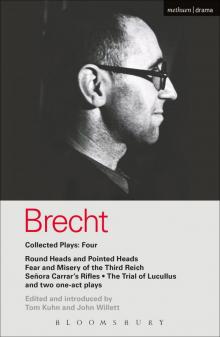 Brecht Collected Plays: 4: Round Heads & Pointed Heads; Fear & Misery of the Third Reich; Senora Carrar's Rifles; Trial of Lucullus; Dansen; How Much Is ... and Misery , Carr (World Classics)
Brecht Collected Plays: 4: Round Heads & Pointed Heads; Fear & Misery of the Third Reich; Senora Carrar's Rifles; Trial of Lucullus; Dansen; How Much Is ... and Misery , Carr (World Classics)